|
|
|
Sort Order |
|
|
|
Items / Page
|
|
|
|
|
|
|
| Srl | Item |
| 1 |
ID:
126660
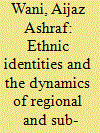

|
|
|
|
|
| Publication |
2013.
|
| Summary/Abstract |
The concept of regional and sub-regional identity as well as regional autonomy has captured the stage of Social Science. The regional autonomy aspirations and the sense of regional and sub-regional identity have offered a new dimension to the assertiveness of ethnic group. Regional identity demands in South and Southeast Asian societies have followed a uniform pattern. These regional autonomy demands evolved over a large span of time may be located in specific geographical and environmental spaces. At one level, these demands remained humane and inclusive, incorporating and reflecting broader human and universal values. At the other level, they acquired the traits of particularism which in the later stages of building multi-cultural and multi-ethnic nation states posed many problems. The plurality of politics is the hallmark of Jammu and Kashmir (J&K) State, and this polarity is essentially the result of cultural diversities that criss-cross the geographical and cultural landscape of Kashmir. The J&K State is not only a conglomerate of three distinct regions - Jammu, Kashmir, and Ladakh - but there are also regions within regions marked off from one another by geography, culture, and history. The politics of regional and sub-regionalism based on region, religion, caste, ethnicity, and so on continues to be stubbornly informed by their respective histories and cultures - thus the resistance against hegemony and the demand for sub-regional autonomies and Hill Development Councils. This article attempts at, looking into the dynamics of these assertions, its impact on the politics of the state, and to delineate the role of different socio-political and historical forces in shaping regional and sub-regional assertions in J&K without, however, suppressing the relative significance of different identity markers.
|
|
|
|
|
|
|
|
|
|
|
|
|
|
|
|
| 2 |
ID:
126661
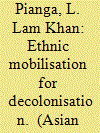

|
|
|
|
|
| Publication |
2013.
|
| Summary/Abstract |
This article attempts to communicate the methodological tension between subjectivity and objectivity by recording the aspiration of communities who are problematised both by colonialism and the modern nation-state. It highlights how colonial policy and practice contribute to the postcolonial imbroglio in Northeast India. It delineates how British colonial cartography always gave priority to 'administrative convenience' in the demarcation of boundaries, resulting in the division of ethnic community. It argues that Northeast India and the Indo-Burma borderland are not yet decolonised, as the government of India, without any rearrangement or alteration, adopts the colonial administrative boundaries, which divided ethnic communities. Neither the State Reorganisation Act (1956) nor the North-Eastern Areas (Reorganisation) Act (1971) fulfilled the aspiration of the segmented communities in the northeast, as they did in the mainland. The article also argues that the responses of the government of India towards the problems in Northeast India react to the manifested symptoms of the deep-rooted political problem rather than getting to the crux of the problem to find a solution.
|
|
|
|
|
|
|
|
|
|
|
|
|
|
|
|
| 3 |
ID:
128311
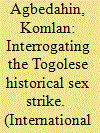

|
|
|
|
|
| Publication |
2014.
|
| Summary/Abstract |
This article, is about an attempt by women in Togo to use a sex strike to end the country's political impasse. The concept dates back to the ancient Greek comedy Lysistrata by Aristophanes, first presented publicly in 411 b.c. More recently, a sex strike had been used with some success in Liberia that inspired Togolese women to attempt this method of non-violent action. The Togolese experiment, however, ended in failure. This article discusses reasons for the failure, including inadequate preparation and miscommunication and the neglect of the political, economic, and social context of Togo.
|
|
|
|
|
|
|
|
|
|
|
|
|
|
|
|
| 4 |
ID:
129990
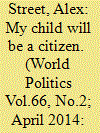

|
|
|
|
|
| Publication |
2014.
|
| Summary/Abstract |
A reform of German citizenship law in 2000 was expected to greatly increase the number of foreign residents becoming German citizens. In fact, the naturalization rate fell and has remained low ever since. This outcome cannot be explained either by existing research on citizenship laws or by scholarship on individual incentives to naturalize. Instead, this article argues that the family context shapes decision making about citizenship, with distinctive behavioral implications. Parents have an incentive to naturalize and thereby extend their new citizenship status to their children. The introduction of a right to citizenship for many children born in Germany to immigrant parents removed this incentive for the parents to naturalize. The author tests the predictions of this argument against both qualitative and quantitative evidence. The article concludes with a discussion of other domains in which it may be possible to gain analytic leverage by studying political decisions in the family context.
|
|
|
|
|
|
|
|
|
|
|
|
|
|
|
|
| 5 |
ID:
128487
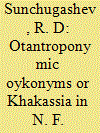

|
|
|
|
|
| Publication |
2013.
|
| Summary/Abstract |
In recent years in linguistics, investigation of proper names including anthroponymics and oykonymics has been developing extensively. Anthroponymics is a branch of onomastics, which studies anthroponyms
-personal names of people: proper names, patronymics (father's names or other names after father), surnames, tribal names, nicknames and pseudonyms (individual or group), cryptonyms (concealing names)';
oykonymics is a branch of toponymy, which studies oykonymsz, i.e. names of any settlements. These branches are still one of the poorly studied ?eld of Turkic onomastics. In Khakass toponymy considerable part of settlements' names belong to anthroponyms, i.e. proper names and surnames. Formed from anthroponyms, oykonyms give important information of linguistic, historical, ethnographical and ethnocultural nature. They point at the bygone settlement of peoples and tribes, reflect traditional folk culture
and change processes in the socio-political and economic life of people.
|
|
|
|
|
|
|
|
|
|
|
|
|
|
|
|
| 6 |
ID:
130225
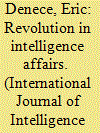

|
|
|
|
|
| Publication |
2014.
|
| Summary/Abstract |
That a "Revolution in Military Affairs" (RMA) took place in the early 1990s is widely known. The concept was born of technological, political, social, and economic changes that were to fundamentally alter the future of warfare, introducing a completely new type of military and organizational structure for the effective projection of force.
Though most experts accepted the reality of a fundamental transformation in the practice of warfare, few saw that a parallel revolution was occurring in the intelligence world, even though this specific field of national security was undergoing similar challenges and change.
That a "Revolution in Intelligence Affairs" in the 1990s and early 2000s actually occurred and its effects has become increasingly evident. This "intelligence revolution" resulted from a combination of changes in international politics, information technologies, and socio-political context.
|
|
|
|
|
|
|
|
|
|
|
|
|
|
|
|
| 7 |
ID:
128113
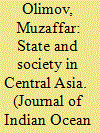

|
|
|
|
|
| Publication |
2013.
|
| Summary/Abstract |
Along with path breaking developments in Eurasia in recent decades, central Asian countries have seen changes in position, identity and orientation of previously isolated countries lying in the heart of Eurasia. Although central Asian countries were previously oriented towards North, now they have turned their attention to the South and East. integration into the international transportation network, construction of new roads, bridges and tunnels, growth of international trade, transport and migration have sharply increased their levels of interaction with the world and especially with neighbors in Eurasia and South Asia, including India.
|
|
|
|
|
|
|
|
|
|
|
|
|
|
|
|
| 8 |
ID:
129566
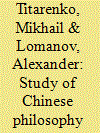

|
|
|
|
|
| Publication |
2014.
|
| Summary/Abstract |
. The article examines the main trends and developments in the study of Chinese philosophy and religion in Russia in this century. Among the leading academic achievements, mention should be made of a comprehensive encyclopedia entitled Spiritual Culture in China (l, studies of the heritage of neo- Confucianism, the role of Chinese philosophy in contacts between China and the West, and the study of the practical aspects of modern religious life in China.
|
|
|
|
|
|
|
|
|
|
|
|
|
|
|
|
| 9 |
ID:
156913
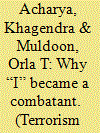

|
|
|
|
|
| Summary/Abstract |
This article analyzes combatants’ accounts of their engagement with the Communist Party of Nepal, Maoist—CPN (M). We use Self-Categorization Theory (SCT) as a framework and thematic analysis as a method to examine how social relationships and contextual factors contributed to political party identification during the ten-year-long Maoist insurgency in Nepal. Based on the study of autobiographical narratives written by Nepali Maoist combatants, we demonstrate that a) key social and political experiences cumulatively evoked feeling positively inclined to partisan attachment; b) CPN (M) party ideology, which was presented as a cure-all to socio-political difficulties, actuated the predisposed people’s partisan alignment; c) families were largely unsupportive of their members’ intention to take part in the war; and when they participated, the family responded with antagonism; and d) party ideologues of the CPN (M), who met the partisan-leaning individuals as close friends, accelerated and sustained their friends’ motivation to become involved in the armed conflict. Together the findings culminate in a view that engagement with CPN (M) during the insurgency occurred despite resistance from family and increased exponentially because of societal and political experiences, the strong appeal of party ideology, and social network dynamics.
|
|
|
|
|
|
|
|
|
|
|
|
|
|
|
|
| 10 |
ID:
130514
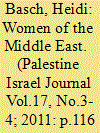

|
|
|
|
|
| Publication |
2011.
|
| Summary/Abstract |
The 100"' Anniversary of lnternational Women's Day on March 8"' was marked around the Middle East by only a small number of events, according to the International Women's Day (IWD) 20]! website. in stark contrast to other parts of globe. Nonetheless, the consistent and visible participation of women in the popular protests which have swept the region during 201 l puts paid to the long-held image ol' Middle Eastern women as passive and powerless beings. What this means regarding the struggle to improve the status of women in the region remains to be seen. As in the rest of the world, the struggle for women's rights in the Middle East is ongoing. Arguably, though, the region poses especially formidable challenges. Nowhere else are the gains already achieved so precarious, or as reliant upon a particular regime and its ability to steer power away from forces opposed to expanding women's rights. The 1979 Iranian Revolution provides prime evidence to that effect: In its aftermath, women ofall social classes, religious backgrounds and political ideologies were Forced to conform to restrictive socio~political and economic roles dictated by Ayatollah Khomeini and his supporters.
|
|
|
|
|
|
|
|
|
|
|
|
|
|
|
|
|
|
|
|
|